Abstract
A total of 599 children with phenylketonuria, who had been treated early, were followed up prospectively in order to examine the association between intellectual progress from 4 to 14 years of age and control of phenylalanine concentrations. The phenylalanine rose from around 400 mumol/l during the first four years to above 900 mumol/l by 12 years. The children were divided into two cohorts: cohort I comprised 224 children born in the United Kingdom between 1964 and 1971 and cohort II 375 children born between 1972 and 1978. In a previous study it was shown that by 4 years of age these children already had a mean intelligence quotient (IQ) over half a standard deviation below general population norms, and that IQ fell linearly as average phenylalanine concentrations rose. Multiple regression was used to estimate the size of the associations between IQ at later ages and average phenylalanine concentrations in the periods between assessments, after controlling for previous IQ and phenylalanine control, social class, type of phenylketonuria, and factors relating to diagnosis and early management. For each 300 mumol/l rise in average phenylalanine concentrations for those aged 5 to 8 years IQ at 8 years fell by 4-6 points. This compared with a 7-10 point fall in IQ at 4 years for a similar rise in phenylalanine. After 8 years of age the association between IQ and phenylalanine control disappeared in cohort I but persisted in cohort II and was significant up to 10 years of age, although the association was smaller than at 8 years.
Full text
PDF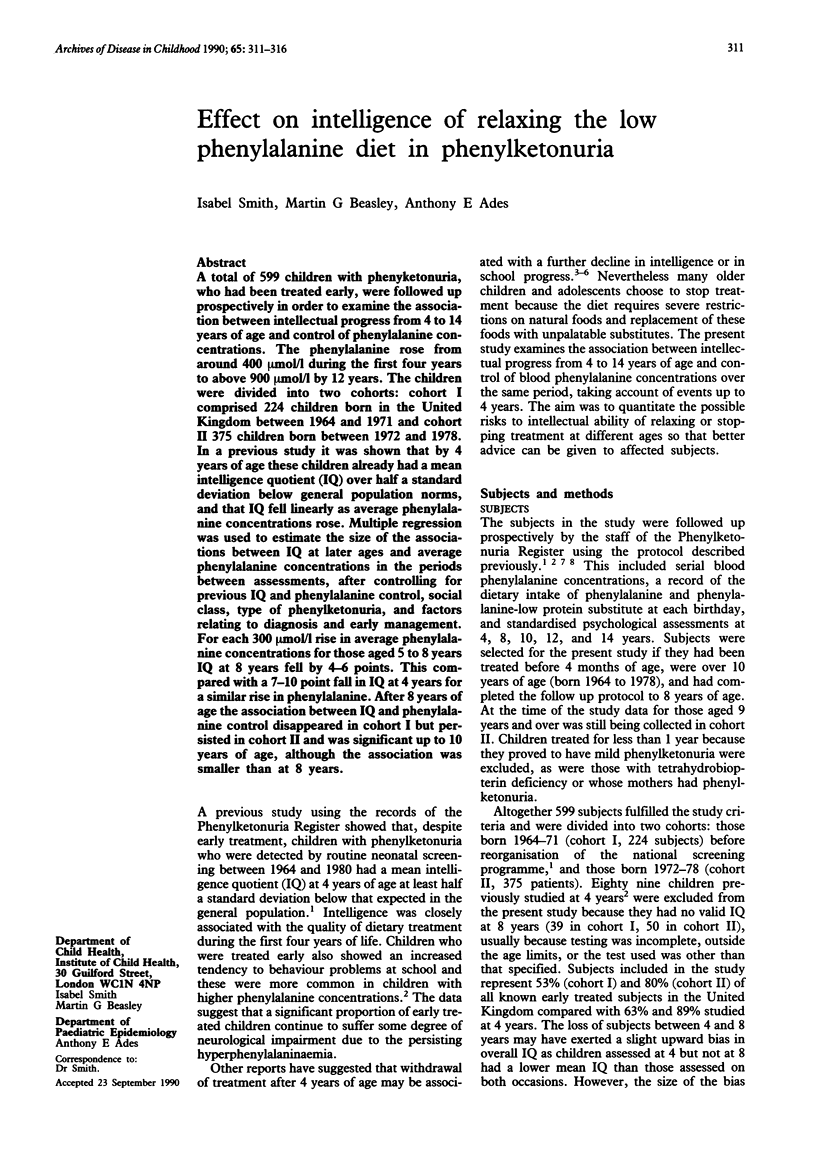
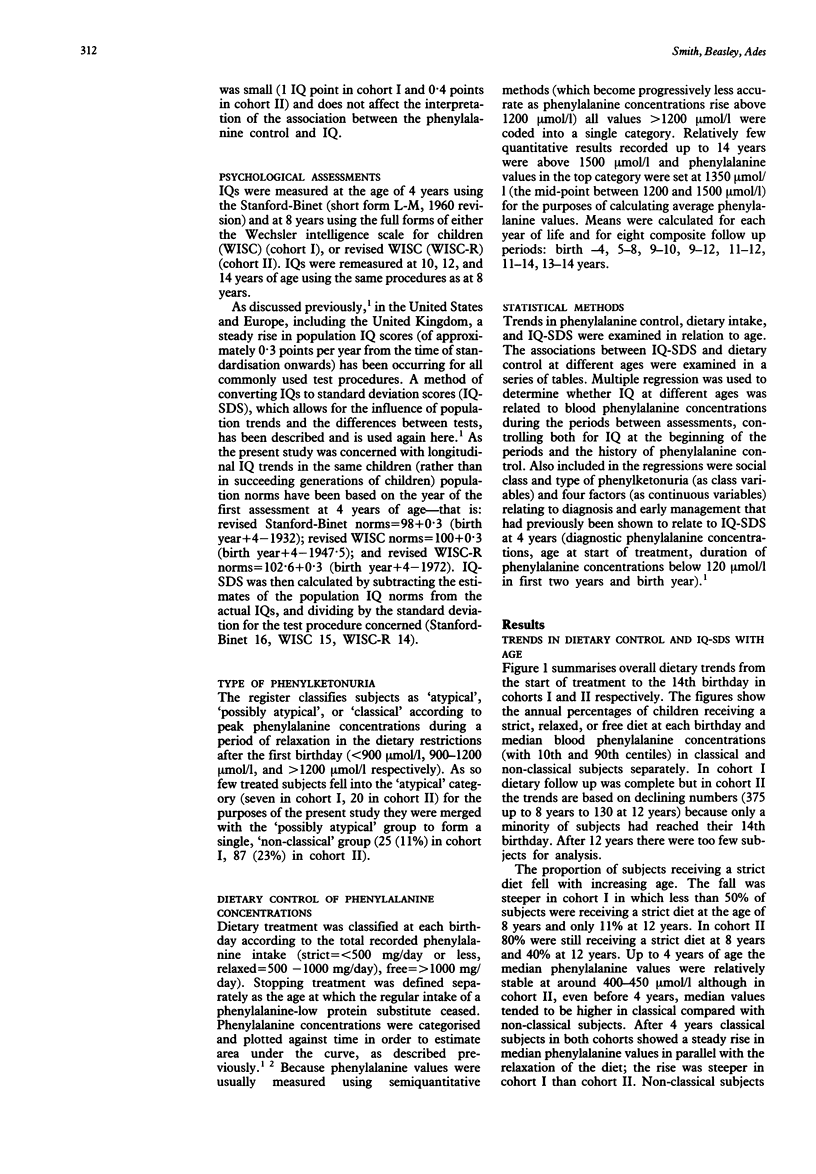
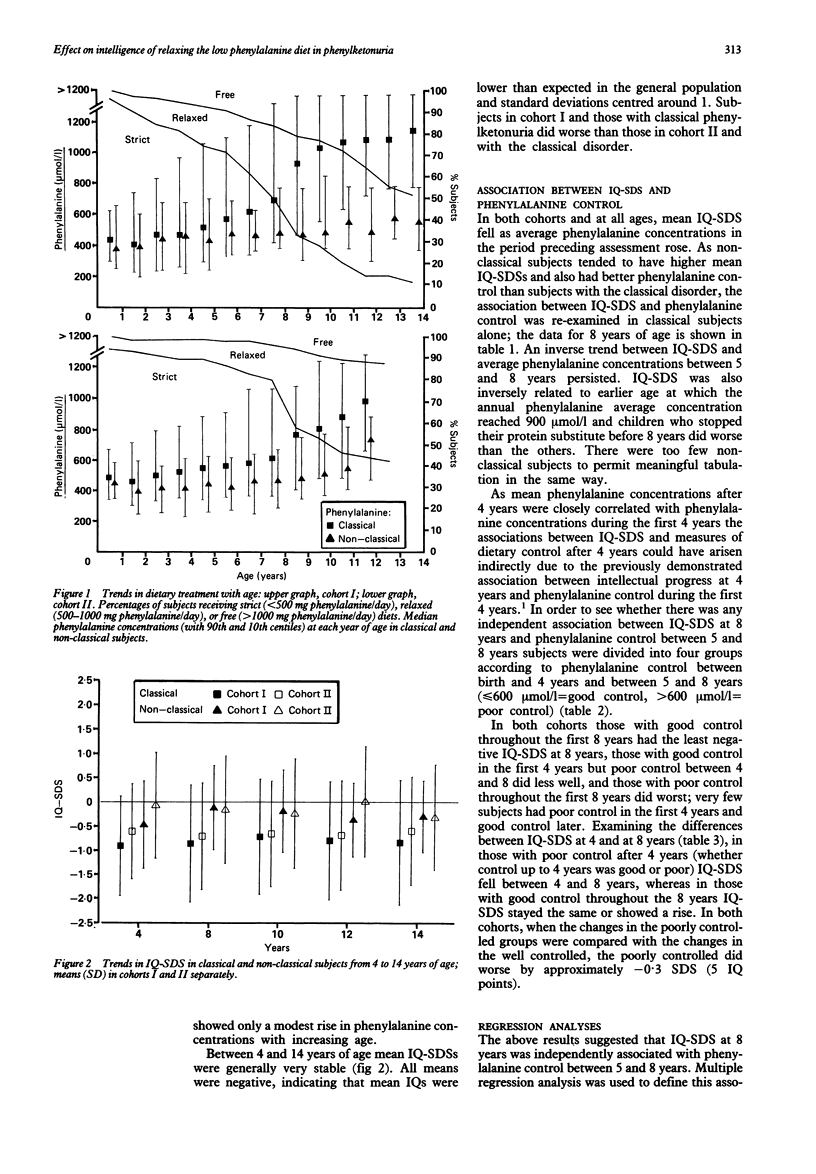
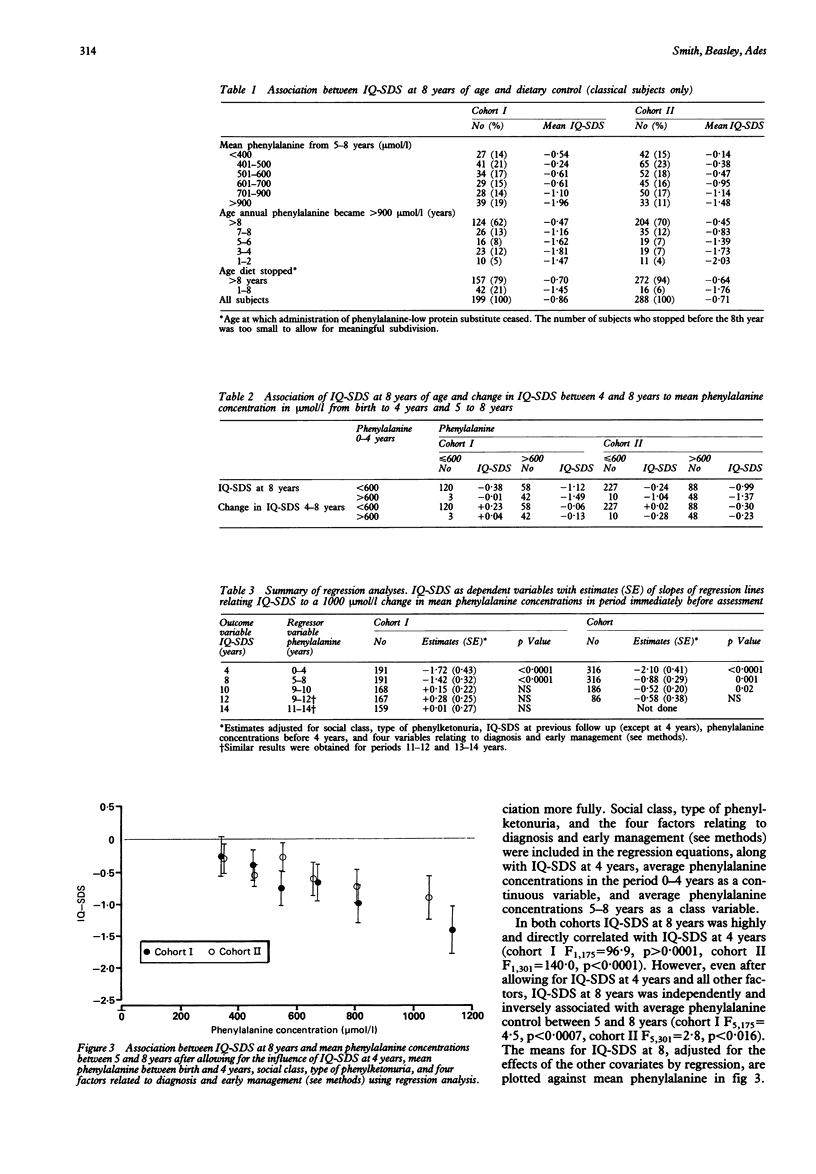
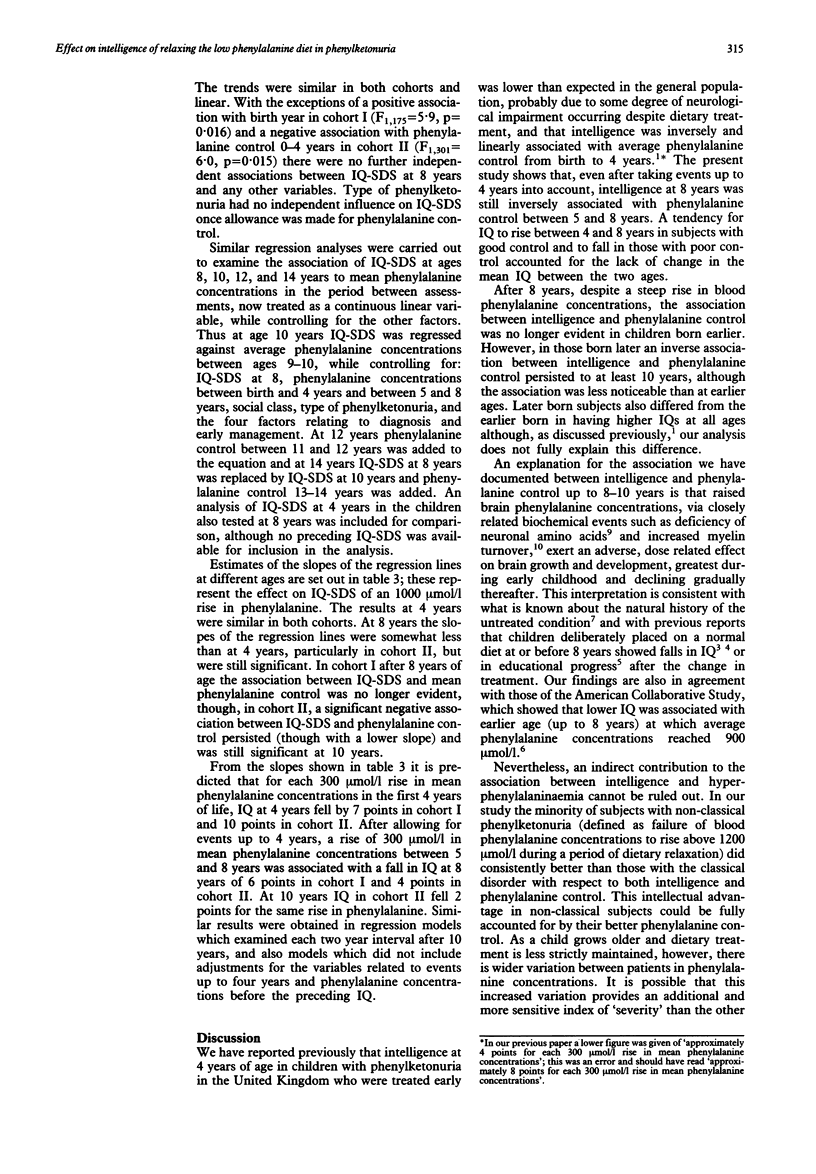
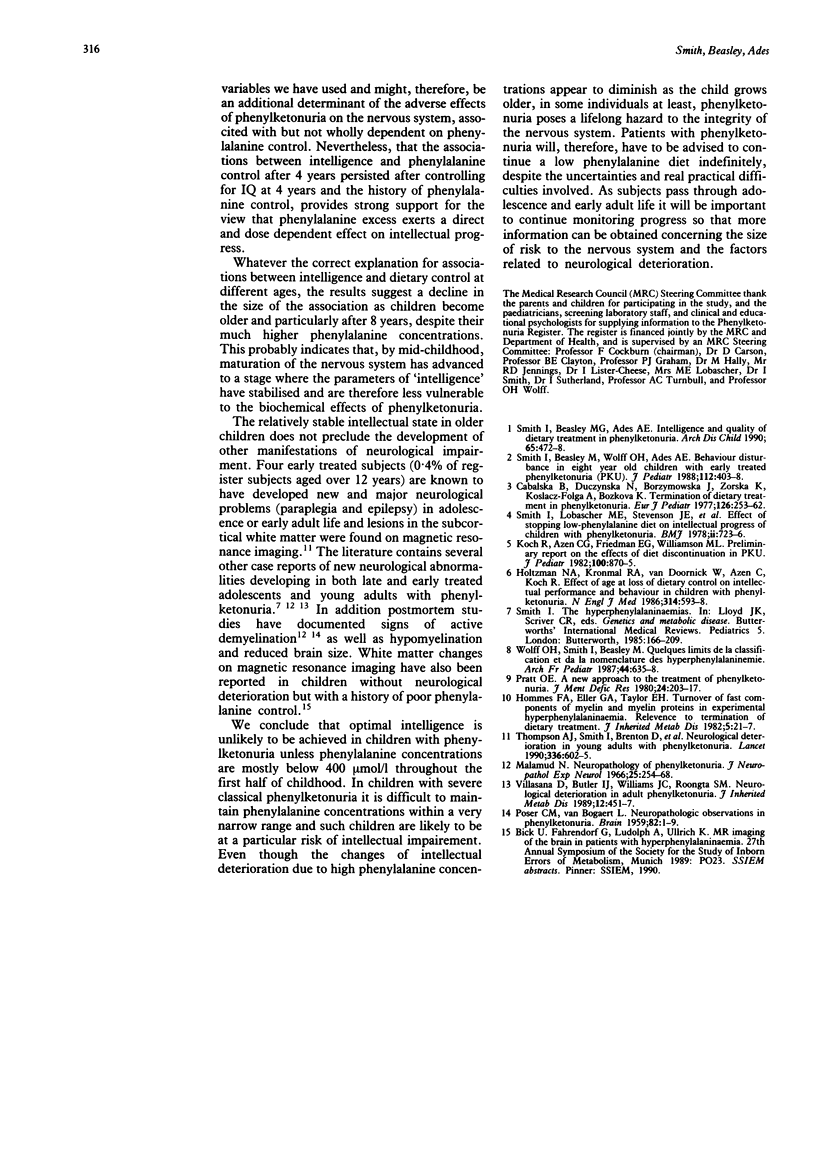
Selected References
These references are in PubMed. This may not be the complete list of references from this article.
- Cabalska B., Duczyńska N., Borzymowska J., Zorska K., Koślacz-Folga A., Bozkowa K. Termination of dietary treatment in phenylketonuria. Eur J Pediatr. 1977 Nov 4;126(4):253–262. doi: 10.1007/BF00477051. [DOI] [PubMed] [Google Scholar]
- Holtzman N. A., Kronmal R. A., van Doorninck W., Azen C., Koch R. Effect of age at loss of dietary control on intellectual performance and behavior of children with phenylketonuria. N Engl J Med. 1986 Mar 6;314(10):593–598. doi: 10.1056/NEJM198603063141001. [DOI] [PubMed] [Google Scholar]
- Hommes F. A., Eller A. G., Taylor E. H. Turnover of the fast components of myelin and myelin proteins in experimental hyperphenylalaninaemia. Relevance to termination of dietary treatment in human phenylketonuria. J Inherit Metab Dis. 1982;5(1):21–27. doi: 10.1007/BF01799750. [DOI] [PubMed] [Google Scholar]
- Koch R., Azen C. G., Friedman E. G., Williamson M. L. Preliminary report on the effects of diet discontinuation in PKU. J Pediatr. 1982 Jun;100(6):870–875. doi: 10.1016/s0022-3476(82)80503-9. [DOI] [PubMed] [Google Scholar]
- Malamud N. Neuropathology of phenylketonuria. J Neuropathol Exp Neurol. 1966 Apr;25(2):254–268. doi: 10.1097/00005072-196604000-00006. [DOI] [PubMed] [Google Scholar]
- POSER C. M., VAN BOGAERT L. Neuro-pathologic observations in phenylketonuria. Brain. 1959 Mar;82(1):1–9. doi: 10.1093/brain/82.1.1-a. [DOI] [PubMed] [Google Scholar]
- Pratt O. E. A new approach to the treatment of phenylketonuria. J Ment Defic Res. 1980 Sep;24(3):203–217. doi: 10.1111/j.1365-2788.1980.tb00074.x. [DOI] [PubMed] [Google Scholar]
- Smith I., Beasley M. G., Ades A. E. Intelligence and quality of dietary treatment in phenylketonuria. Arch Dis Child. 1990 May;65(5):472–478. doi: 10.1136/adc.65.5.472. [DOI] [PMC free article] [PubMed] [Google Scholar]
- Smith I., Beasley M. G., Wolff O. H., Ades A. E. Behavior disturbance in 8-year-old children with early treated phenylketonuria. Report from the MRC/DHSS Phenylketonuria Register. J Pediatr. 1988 Mar;112(3):403–408. doi: 10.1016/s0022-3476(88)80320-2. [DOI] [PubMed] [Google Scholar]
- Smith I., Lobascher M. E., Stevenson J. E., Wolff O. H., Schmidt H., Grubel-Kaiser S., Bickel H. Effect of stopping low-phenylalanine diet on intellectual progress of children with phenylketonuria. Br Med J. 1978 Sep 9;2(6139):723–726. doi: 10.1136/bmj.2.6139.723. [DOI] [PMC free article] [PubMed] [Google Scholar]
- Thompson A. J., Smith I., Brenton D., Youl B. D., Rylance G., Davidson D. C., Kendall B., Lees A. J. Neurological deterioration in young adults with phenylketonuria. Lancet. 1990 Sep 8;336(8715):602–605. doi: 10.1016/0140-6736(90)93401-a. [DOI] [PubMed] [Google Scholar]
- Villasana D., Butler I. J., Williams J. C., Roongta S. M. Neurological deterioration in adult phenylketonuria. J Inherit Metab Dis. 1989;12(4):451–457. doi: 10.1007/BF01802042. [DOI] [PubMed] [Google Scholar]
- Wolff O., Smith I., Beasley M. Quelques limites de la classification et de la nomenclature des hyperphénylalaninémies. Arch Fr Pediatr. 1987;44 (Suppl 1):635–638. [PubMed] [Google Scholar]


